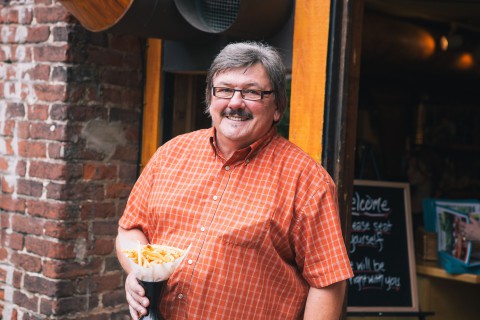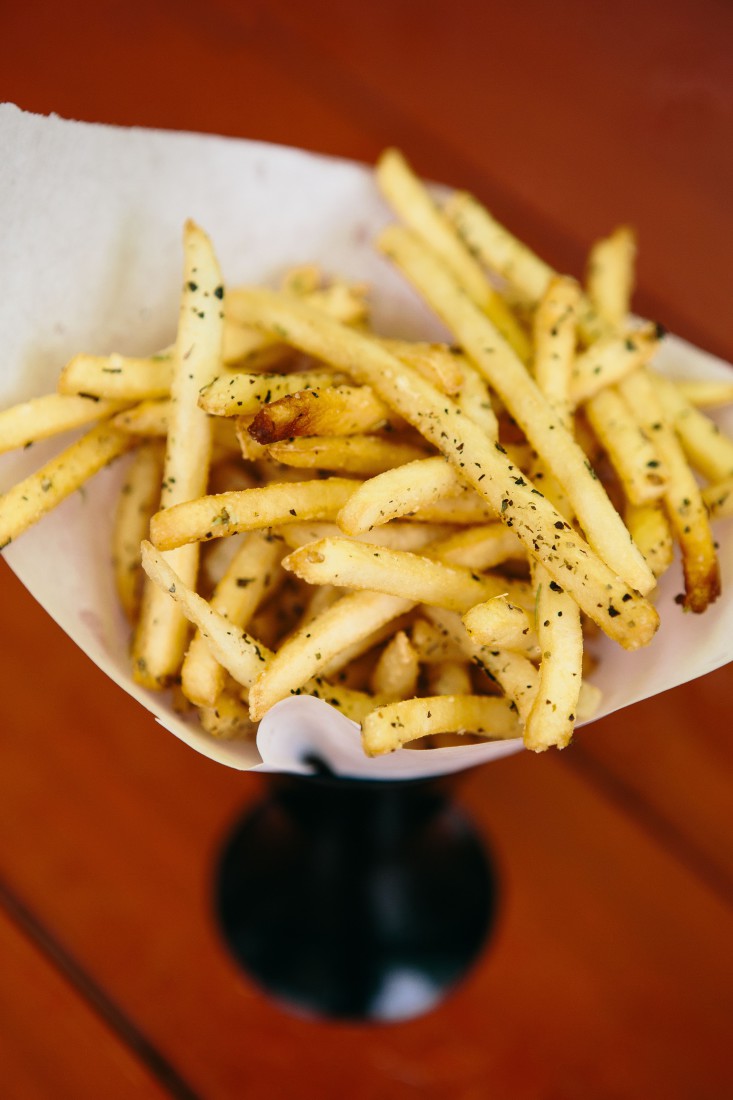Asheville thinks of itself as a willfully healthy town, a place where spirulina shakes are as easy to come by as beer.
But next time you order a kale salad, don’t be surprised if nestled right next to it is the best order of french fries you’ve ever had.
“Asheville has a dual personality disorder,” says Steven Goff, executive chef and owner of the King James Public House. “People here are into superhealthy things, and they’re foodies. And foodies love french fries if you do them right.”
Susy Salwa Phillips, aka the Gypsy Queen of food truck fame, agrees: “I have people drilling me about what kind of potatoes I use. Are they organic? What do I fry them with? If Ashevilleans are going to eat fries, the fries better be well-behaved and freaking good.”
Ashevillean Dan Allen — who favors Farm Burger fries — has no problem mixing healthy leanings with spuds: “A potato is a vegetable. Likewise ketchup. Now add a cold beer — hops, yeast, grain — and hell, you’re a vegetarian.”
Doing fries right
First, don’t even think about using a potato that isn’t a russet, which has the right balance of starch to sugar, says Jacob Sessoms, owner and chef at Table, who admits he only eats french fries at Farm Burger because it’s just wrong to eat a burger without fries. “Sit down with a hamburger and a salad, and you just feel like a fool,” he says.
And cut them thin, says Phillips, whose favorite fries are at Table: “They’re like perfect pommes frites.”
After cutting the spuds, chefs give them a low-temperature bath called blanching. Goff blanches his in water, as does Phillips; Sessoms in oil. “You’re neutralizing the sugars and isolating the starch,” says Sessoms.
That’s all done with fresh potatoes before you even show up hungry. Place your order, and now the chilled, blanched fries get deep fried so the outside is crispy, the inside velvety.
Although in fry fantasies, you may hope for taters crisped in truffle oil or duck fat — or, as the French do, horse fat — Sessoms, Goff and Phillips each use canola oil, a nod to Asheville’s vegetarian-friendly habits.

Bare bones or toppings?
Now, a dilemma: Eat them plain or sauced?
“I like my fries to be Lebanese, drizzled with tahini, garlic and parsley,” says Phillips, who learned to fry potatoes at her mother’s knee in Lebanon, once a colony of France: “They were the first thing I knew how to make besides tabouli. ”
Goff, a self-described potato junkie, learned one thing early: If tofu can be a repository for anything you want to put on it, fries are better: “They should be able to stand alone. But a lot of times they are a vehicle for other things,” he says. His favorite accompaniment is bravas sauce, a spicy Spanish mix of stewed tomatoes, cumin and coriander. That is, after he hits his frites with clarified butter and salt right out of the fryer, which he admits is “kind of like cheating.”
“Fries were not intended for sauces,” says Frenchman Michel Baudouin, owner and chef at Bouchon. “But everyone likes to add his personal touch, just as I do by tossing them in herbs.”
And if you want fries that are wayyyy out there, try Strada Italiano’s salty fries doused in maple syrup and butter. Move over French toast.
A fry’s lineage
But here is the question: Is a french fry really French?
“French fries aren’t French, they’re Belgian,” says Parisian Ghislaine Mahler, founder and owner of Ma Belle France in Asheville. “And in France, we call them ‘frites.’ French fries are an American thing.”
Baudouin, who left France 35 years ago, agrees. “They originated in Belgium,” he explains. “But maybe they’re called french fries because more Americans visit France than Belgium.”
“Maybe they’re called French because fries go along with the French kiss,” says Phillips. “Ooooh, la la. Anything sexy or good is associated with France.”
Either way, Americans — and Ashevilleans — have seized on them. “French fries define the American palate,” says Sessoms. “They’re the cornerstone of American comfort food.”
As for their health profile, well, there’s always your psychological health. Says Phillips, “Eat french fries, and everything is so much better.”




It would be a mistake for readers to think that only the few places identified in this article have great fries. There are many other restaurants that offer yummy fries as well. And this excludes any fast-food or other chain restaurant.
What are some of your favorite local sources of les frites?
I haven’t tried them all, of course, but two that come to mind are Asheville Pizza and Brewing (Coxe Ave.) and a little place off Leicester Hwy. called Pappas (not the pizza chain).
I’m sorry, but this is just SO WRONG.
But I’m glad to have the opportunity to instruct and help Asheville’s top chefs.
No, the Russet is not the best potato for Freedom Fries. Real French Fries (pommes frites) from Belgium and northern France are done with Bintje potatoes. They have a crispier and crunchier crust with a sweeter creamier ‘mousse’ inside (which contrasts nicely with the crisp outside).
Alas, Bintjes are rarely available here; but there is a gloriously appropriate local star to take its place: the Kennebec.
In fact, Kennebecs grow better here in Western North Carolina than the dumpy Russet. Alas somemore, some local farmers have cut back on the Kennebec because cooks are oblivious to its availability.
Do a ‘kennebec’ search on MountainX and you’ll see LAB used to use them. What got lost there?
[btw: vegetable oil works as well or better than beef tallow.]
Russets are available everywhere; and they’re fine for baking (maybe the best), and great for mashing; but, if you want the best pommes frites in Buncombe County…it’s the KENNEBEC.
P.S. My home grown Kennebecs from my small home garden are coming in next week. I offer the challenge and the opportunity to ANY local chef: I’ll bring a Kennebec to your fry kitchen and manifest a better French Fry than you can make with a Russet.
P.P.S. When kids in France play with the ‘Mr. Potato Head’ toys, they always put a sad face on Mr. Russet.
Fascinating info. Are there any stores or farmers markets in WNC where we can buy Kennebecs?
I’m also under the impression that there’s a significant difference in the frying properties between new and old (been stored a while). Anyone have experience with this?
I’ve kept Kennebecs [refrigerated] for almost a year and didn’t notice any difference.
If your talking about something like in “The Joy of Cooking” where she says ‘mature potatoes’, I believe she’s talking about potatoes that grew to maturity rather than having been harvested earlier.
Kennebecs show up in some farmer’s markets sometimes…[good luck] I’ve seen them at the big market on Brevard, but they were tiny seed potatoes…they fry ok, but the mature ones, which can be bigger than a softball, are much better.